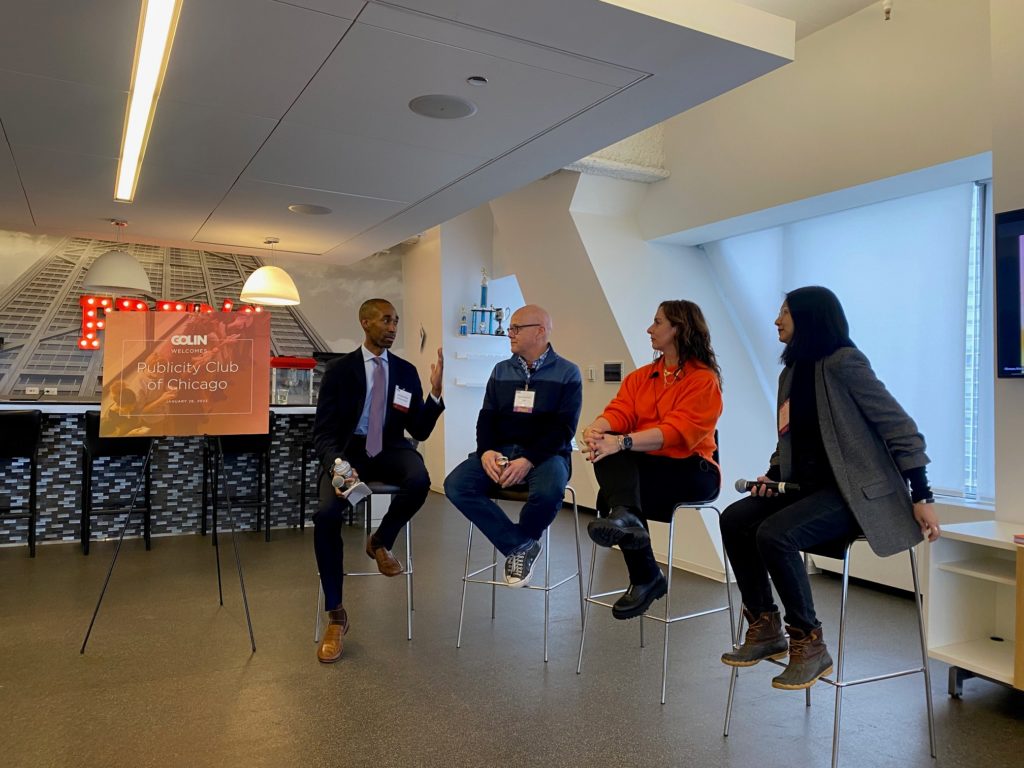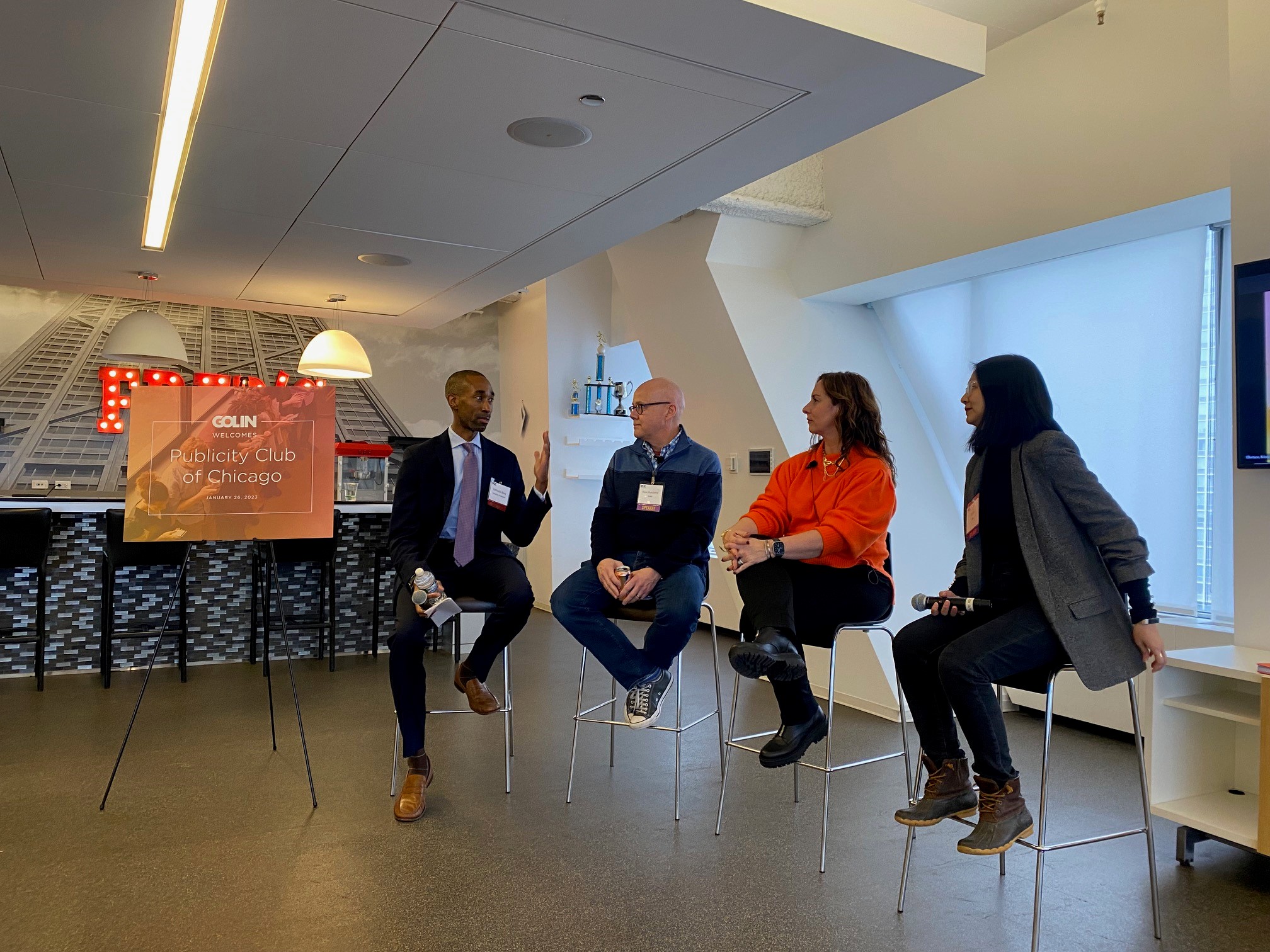The recent influx of societal issues has led to increasingly sophisticated activism targeting companies and brands like never before, from both inside organizations and out. Employees are uniting and harnessing their influence over company decision making, while consumers are demanding that brands clearly articulate their stances on myriad topics. All this activism leaves leaders and communicators grappling with questions about whether and how to communicate around the issue of the day.
We recently co-hosted a conversation with the Publicity Club of Chicago on why companies and brands need to stay true to their values and operating track records if they intend to thread the needle in these hypersensitive times. Our panelists appear below:
- Dave Duschene, executive director, crisis & issues
- Laura Sutphen, managing director, social impact + inclusion practice
- Gaik Ping Ooi (GP), vice president of employee communications & engagement
Led by Moderator DeRondal Bevly, president of the PCC board of directors, the panel explored how brands can protect their reputation in the face of public expectations.
Moderator: “COVID-19 brought some very interesting changes to how we work virtually. We also need to be more deliberate in how we think about our mental and physical health. Please talk about the past three years or so and what that’s been like for you and your team as you’ve not only navigated yourselves, but also helped clients navigate it.”
GP Ooi: “Since the pandemic, so much more has fallen onto our plates as communications professionals – and there are pros and cons that come with that. For employee comms practitioners, it can feel as though everything in the news is something they will need to manage. We see more companies investing in engagement and communication to their employees. We used to hear companies would prioritize consumers and customers. Now, leaders continue to show up as empathetic human beings who care for their employees – and that’s a good place to be in.”
Moderator: “There have been lots of crisis-related issues recently. As the executive director of issues and crisis, what’s that been like?”
Dave Duschene: “The three of us are up here together today as a result of what happened over the last three years. Not to say we worked independently before, but we’ve worked more closely since the start of the pandemic and after the murder of George Floyd. Communicators and their executive leadership teams have been pressed to take stands on issues that they haven’t necessarily been comfortable before.”
Moderator: “How do you help organizations and leaders determine the temperature in terms of whether to weigh in?”
Dave: “We work with a lot of clients to evaluate which conversations they should take part in. We’ve simplified these discussions as much as possible because decisions must be made in an instant. We talk about making a stand in terms of authenticity – asking the internal communications team, ‘Is this particular issue relevant to who you are as a brand, and how are you actually acting on the situation internally to show it matters to you?’
Moderator: “Laura, can you walk us through how you help clients look at what they’re doing in the marketplace, what could happen next and how to position themselves?”
Laura: “We look at it as the meaningful role that brands can play. We help brands figure out a social purpose that is true to their brand, true to what their customers and employees and their external stakeholders believe, but also something that connects to what is meaningful and culturally relevant. When you intersect those three, you can help brands get ahead of an issue before it becomes something that they have to do.”
Moderator: “How central is a company’s values, and can it appear to be forced to capitalize on a particular situation?”
Laura: “Al Golin used to say, ‘Fix it before it’s broken.’ If your employees’ and your company’s values are aligned, they become the foundation for a social issue that you can meaningfully take on.”
Moderator: “Looking forward, what are one or two tips to share with organizations now, keeping in mind the changing landscape and how organizations must be nimble?”
Dave: “You have to do what’s authentic to you and what’s relevant to your brand. You have to make sure that you’re not just putting words out there. You’re going to take action. It’s going to come back to these things.”
GP: “Authenticity is really important. Regardless of what public position a company takes, and whether or not they communicate publicly, leaders should always keep in mind that they have a responsibility to care for and help their employees.”
Laura: “Key to that is access to unbiased and accurate information. Employers have a responsibility to provide fair information.”
Moderator: “Internally, organizations are polarized. As folks get older, young work forces get younger. How are you helping your clients navigate some of the internal communications problems that they might be having?”
GP: “I’ve learned a lot in recent DEI trainings by Golin on our innate biases. From there, having really clear plans on ensuring diversity in your board and leadership – the key decisionmakers – to account for those different perspectives and drive inclusion within the organization.”
Laura: “One program that we’ve had at Golin for a few years that has been super instrumental is a reverse mentoring program, which brings to light generational change in thinking. There is not only a generational gap, but also a values gap… a whole different way of seeing the world.”
Moderator: “How can organizations handle layoffs better? Is that the cost of doing business? Do companies need to build that into their communications planning?”
GP: “How companies manage layoffs can deeply affect their reputation as an employer, especially when they’re becoming more public these days. Additionally, it affects the morale of the remaining employees. Most companies need to do a better job of weaving in respect, integrity and support in the process because people’s lives are being impacted.”
Moderator: “It seems people trust business leaders more so than politicians, journalists or some media outlets. Do your clients feel the need to lead and have a bigger presence, and how do you prepare them?”
Dave: “Think about the impact on your personal image, but also think on the fact that you have a business to run and employees who work for you – but may not share the same views as you. And ultimately, you’re trying to succeed as a business leader.”
Laura: “The C-Suite is telling their leaders to find a purpose for the brand. It’s consumer loyalty to a brand because they’re doing the right thing, but it’s also loyalty to the brand when something goes wrong and because they’ve done the right thing, they know how to react.”
Moderator: “Last summer, communicators talked about they are more entrenched now in their clients’ legal and HR departments. Can you give us a sense of what you’re seeing now, and if that’s something that’s here to stay?”
Dave: “When it comes to in-house counsel and retained counsel – the lawyers that I interact with on the client side – they are becoming more sophisticated. They understand if you win something in court of law, you might not win in the court of public opinion or vice versa. Same with HR professionals. They’re being called in as trusted advocates for understanding employee sentiment.”
Moderator: “Is there something emerging – that may be relatively quiet now – that you want us to think about as it could be an issue in the coming months?”
Dave: “The one that I continually watch because it affects so many other things is voting rights and voting access. This issue is going to be the key that turned so many other things either to the good or the bad for many companies and brands.”
Laura: “Environmental racism. Climate change is real. We are feeling it every day. And the outsized impacts on low income or communities of color is a blind spot for corporations.”
GP: “What the future of work looks like and means to employers and a more diverse and multigenerational employee base that is more vocal about the economic and societal pressures they are enmeshed in.”

